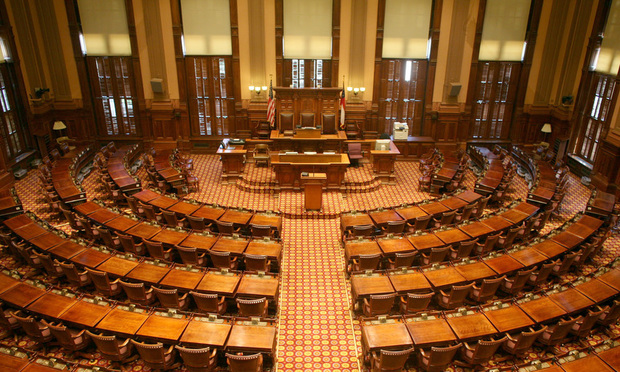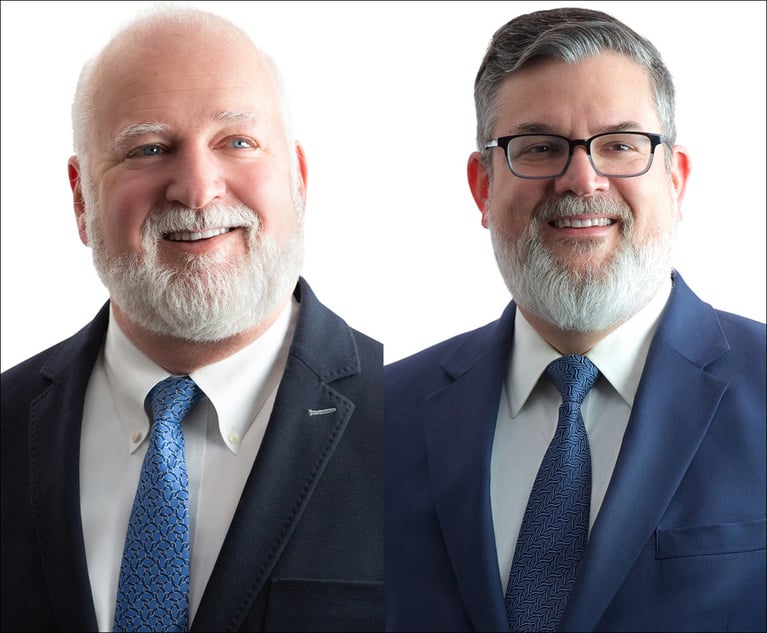New Georgia Lawyer-Legislators Knocked on Lots of Doors
Plaintiffs lawyer Matthew Wilson, a Democrat, and tax lawyer Bonnie Rich, a Republican, are among the six lawyers who won seats in the state General Assembly. Both said they want to keep Georgia great.
November 21, 2018 at 04:39 PM
9 minute read
 State of Georgia House of Representatives, House Chamber. (Courtesy photo)
State of Georgia House of Representatives, House Chamber. (Courtesy photo)
Democrat Matthew Wilson and Republican Bonnie Rich, two of the six new lawyer-legislators who will join the Georgia General Assembly in January, didn't have big war chests and ran grass-roots campaigns—but still managed to raise the six figures needed to compete.
Both ran in hotly contested districts. Wilson, a partner at plaintiffs firm Akin & Tate, won House District 80, made up of Brookhaven, parts of Sandy Springs and Chamblee. Rich, the only Republican of the new lawyer-legislators, won House District 97, encompassing Duluth, Suwanee, Sugar Hill and part of Buford. Rich has been teaching tax law part-time at her law school alma mater, Georgia State University, while raising her two children. She also started her own general practice firm four years ago representing small businesses and individuals.
Three of the other newly elected lawyers are also in the House: solo plaintiffs lawyer Mike Wilensky in District 79 (Dunwoody); Beth Moore, another solo practicing entertainment and business law, in District 95 (Peachtree Corners and parts of Johns Creek, Berkeley Lake and Duluth); and Krevolin & Horst associate Josh McLaurin in District 51 (Sandy Springs, Roswell and Johns Creek).
Zahra Karinshak, a partner at Krevolin & Horst, is senator-elect for District 48 (Gwinnett and North Fulton counties).
Except for Wilson's intown Brookhaven district, these outlying Atlanta districts encompass the same swath of Fulton, DeKalb and Gwinnett counties, just north of I-285 and west of I-85. Rich, in fact, said she'd been friends with Karinshak, the new Democratic senator-elect, since their children were born.
Making a Difference
Wilson and Rich have different agendas, but both said they decided to run for office to effect positive change in their communities.
 Matthew Wilson, Akin Tate, Atlanta.
Matthew Wilson, Akin Tate, Atlanta.Wilson, 34, said the Legislature's repeated attempts to pass anti-gay “religious freedom” legislation and Donald Trump's election as president inspired him to run.
“My frustration at what I've seen our legislators focus on over the last six years really motivated me to ask myself what I could do to have an impact,” said Wilson, adding that he had lobbied as a citizen at the Capitol against the proposed bills.
“As a gay man, obviously they impact me directly,” he said, adding that he emphasized to legislators their negative impact “on the perception of Georgia as welcoming for all citizens—not to mention the economic impact.”
Trump's election, he added, was “a signal to all of us that we have to do more than just vote. So I did.”
District 80 has seesawed from blue to red over the years, and Wilson said the Democrats thought it was the top House district that they had a chance of flipping. It had the “strongest Hillary performance” in 2016, he said, by a margin of 14 percentage points over Trump, for Georgia House districts where a Republican won the Statehouse vote.
Rich, 49, said now that her children are teenagers, she has time to devote to public service.
“I never had political aspirations. I wanted to do something that mattered and that I cared about, and my family is not dependent on my having a big lawyer income,” said Rich, who lives in Suwanee. “This is my community, where we've reared our children, and it's a wonderful place for families.” She wants to keep Gwinnett that way.
She'd been considering joining a nonprofit when her husband read her the news one Saturday morning in February that Rep. Brooks Coleman, the Republican who'd represented her district for 26 years, was retiring.
“That was a lightbulb moment,” Rich said, adding that her husband, Gwinnett County Superior Court Judge Randy Rich, simultaneously suggested that she run for the seat.
Making the Calls
The big challenge, both first-time candidates said, was raising money—and both said they relied heavily on individual donations, not special interest PACs.
 Bonnie Rich, Suwanee Ga.
Bonnie Rich, Suwanee Ga.Rich faced a crowded primary against five other Republican contenders, then a runoff, before the general election against Democrat Aisha Yaqoob, a civil rights activist and the daughter of Pakistani immigrants.
Rich said she couldn't believe it when she was told it would cost about $100,000 to run an effective campaign—but it did.
She and her husband are the first in their families to go to college, Rich said, so neither has any family money. After spending $16,000, she added, she “had a panic moment” and realized she needed to start asking people for money.
“It was really hard,” Rich said. She started with close friends and neighbors, who gave generously. “It was humbling that they believed in me enough,” she said, adding that they too are middle class and raising families, not wealthy people.
Encouraged, she started asking colleagues in the legal community, who also contributed. Her GSU Law class of 1994 even held a fundraiser for her. “Lawyers want more lawyers in the Legislature,” she said.
Those contributions, plus others from local businesses and friends of friends, got her through the primary and runoff, Rich said, and then members of the Republican caucus contributed in the general election. “Very little money came from special interests,” she said.
While Wilson was also running for the first time, he had worked on fellow plaintiffs lawyer Roy Barnes' 2010 campaign for governor, so he knew what he was getting into. His campaign raised and spent $150,000. His opponent, Republican Meagan Hanson, reported just over $200,000 in contributions to the Georgia Government Transparency and Campaign Finance Commission.
That meant putting in a lot of time on the phone, Wilson said, “calling all my friends and family and anyone I'd ever known.”
The three main sources were fellow trial lawyers, the LGBTQ community and supporters of his Democratic predecessor, Taylor Bennett, he said, adding that he pledged not to take any corporate PAC money.
“Ninety-seven percent of my money came from individuals—over 600,” he said, which included a lot of personal checks from trial lawyers.
He said it's easier to convince a trial lawyer to get involved than someone who's never donated to a campaign, because “we are faced every year with threats to our profession in the Legislature, so we're used to being involved in campaigns and the political process.”
The same goes for the LGBTQ community, he said. “They know what it takes to run a strong campaign, especially against an incumbent.”
Door-Knocking
Wilson said he and his team, including campaign manager Eliot Beckham, knocked on more than 20,000 doors in the hotly contested race. He did three complete rounds himself, starting out in April on nights and weekends, and then volunteers joined him in August.
Rich took a leave of absence from GSU Law for the spring semester so she could do the same thing.
The two said knocking on doors was their favorite part of the campaign, because it was a chance to meet all kinds of people in their districts and hear their concerns.
“I met so many interesting people,” said Rich, noting that her district has grown very diverse, both ethnically and socioeconomically. The people she talked to “had the same values though—family-oriented, hard workers, who were informed and involved in the political process,” she said.
Wilson thinks his strong field campaign made the difference, adding that he received congratulatory emails and texts from people saying that he came to their door a couple of times during the campaign.
Juggling Law and Legislature
Wilson said he'll take a break from practicing law during the session, which he can only do because of the support of his partners, Lester Tate, Morgan Akin and Emma Paige.
He added that there is a law that allows lawyer-legislators to automatically stay their state court cases for the session's duration, plus three weeks, but said that it might be easier to do on the defense side.
“I have clients who are very impatiently awaiting an outcome in their cases,” he said, so his partners will help out.
The Democrats netted 11 new House members for the next session, for a total of 75, compared with 105 Republicans, so they'll have more opportunity to influence legislation, Wilson said, noting that there are disparate factions in the Republican camp, such as the Freedom Caucus and those who are more socially moderate.
“I'm excited to see what we're able to accomplish in January,” he said. “Obviously having a new governor dramatically influences that,” he added, referring to Republican Brian Kemp.
Rich said she wants to further the Republican goal of making Georgia a good place to do business. “It's good for all Georgians, not just the businesses that are here,” she said.
But she added, “My heart is with children, the elderly and disabled, and animals—the vulnerable.”
While Rich expects she'll be asked to assist on business-oriented legislation because of her background in tax and law, she said, “Anyone looking for a partner on those issues has one in me.”
“I want to be a voice of reason for the Republican party,” she added.
This content has been archived. It is available through our partners, LexisNexis® and Bloomberg Law.
To view this content, please continue to their sites.
Not a Lexis Subscriber?
Subscribe Now
Not a Bloomberg Law Subscriber?
Subscribe Now
NOT FOR REPRINT
© 2025 ALM Global, LLC, All Rights Reserved. Request academic re-use from www.copyright.com. All other uses, submit a request to [email protected]. For more information visit Asset & Logo Licensing.
You Might Like
View All

Sunbelt Law Firms Experienced More Moderate Growth Last Year, Alongside Some Job Cuts and Less Merger Interest
4 minute read
Fowler White Burnett Opens Jacksonville Office Focused on Transportation Practice
3 minute read
Georgia High Court Clarifies Time Limit for Lawyers' Breach-of-Contract Claims
6 minute readTrending Stories
- 1Investor Sues in New York to Block $175M Bitcoin Merger
- 2Landlord Must Pay Prevailing Tenants' $21K Attorney Fees in Commercial Lease Dispute, Appellate Court Rules
- 3Compliance with EU AI Act Lags Behind As First Provisions Take Effect
- 4NJ's Pardons and Commutations A Model for the Federal System
- 5As Political Retribution Intensifies, Look to Navalny's Lawyers
Who Got The Work
J. Brugh Lower of Gibbons has entered an appearance for industrial equipment supplier Devco Corporation in a pending trademark infringement lawsuit. The suit, accusing the defendant of selling knock-off Graco products, was filed Dec. 18 in New Jersey District Court by Rivkin Radler on behalf of Graco Inc. and Graco Minnesota. The case, assigned to U.S. District Judge Zahid N. Quraishi, is 3:24-cv-11294, Graco Inc. et al v. Devco Corporation.
Who Got The Work
Rebecca Maller-Stein and Kent A. Yalowitz of Arnold & Porter Kaye Scholer have entered their appearances for Hanaco Venture Capital and its executives, Lior Prosor and David Frankel, in a pending securities lawsuit. The action, filed on Dec. 24 in New York Southern District Court by Zell, Aron & Co. on behalf of Goldeneye Advisors, accuses the defendants of negligently and fraudulently managing the plaintiff's $1 million investment. The case, assigned to U.S. District Judge Vernon S. Broderick, is 1:24-cv-09918, Goldeneye Advisors, LLC v. Hanaco Venture Capital, Ltd. et al.
Who Got The Work
Attorneys from A&O Shearman has stepped in as defense counsel for Toronto-Dominion Bank and other defendants in a pending securities class action. The suit, filed Dec. 11 in New York Southern District Court by Bleichmar Fonti & Auld, accuses the defendants of concealing the bank's 'pervasive' deficiencies in regards to its compliance with the Bank Secrecy Act and the quality of its anti-money laundering controls. The case, assigned to U.S. District Judge Arun Subramanian, is 1:24-cv-09445, Gonzalez v. The Toronto-Dominion Bank et al.
Who Got The Work
Crown Castle International, a Pennsylvania company providing shared communications infrastructure, has turned to Luke D. Wolf of Gordon Rees Scully Mansukhani to fend off a pending breach-of-contract lawsuit. The court action, filed Nov. 25 in Michigan Eastern District Court by Hooper Hathaway PC on behalf of The Town Residences LLC, accuses Crown Castle of failing to transfer approximately $30,000 in utility payments from T-Mobile in breach of a roof-top lease and assignment agreement. The case, assigned to U.S. District Judge Susan K. Declercq, is 2:24-cv-13131, The Town Residences LLC v. T-Mobile US, Inc. et al.
Who Got The Work
Wilfred P. Coronato and Daniel M. Schwartz of McCarter & English have stepped in as defense counsel to Electrolux Home Products Inc. in a pending product liability lawsuit. The court action, filed Nov. 26 in New York Eastern District Court by Poulos Lopiccolo PC and Nagel Rice LLP on behalf of David Stern, alleges that the defendant's refrigerators’ drawers and shelving repeatedly break and fall apart within months after purchase. The case, assigned to U.S. District Judge Joan M. Azrack, is 2:24-cv-08204, Stern v. Electrolux Home Products, Inc.
Featured Firms
Law Offices of Gary Martin Hays & Associates, P.C.
(470) 294-1674
Law Offices of Mark E. Salomone
(857) 444-6468
Smith & Hassler
(713) 739-1250






